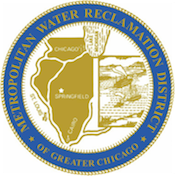Metropolitan Water Reclamation District of Greater Chicago
Chief of Police (#20002489)
General Statement
Under direction, supervises the District's police force, directs the implementation of security procedures, and maintains a continuing evaluation of security effectiveness.
Essential Job Functions
Essential job functions are fundamental, core functions common to positions in a classification. They are not intended to be an exhaustive list of all job duties for any one position in the class. Since class specifications are designed to be descriptive and not restrictive, incumbents may complete one or all of the job duties listed or tasks of similar kind not specifically listed here.
· Assigns,
coordinates and supervises work done by subordinates; coaches, mentors, disciplines,
directs or adjusts grievances of other employees or effectively recommends
their hiring, transfer, suspension, layoff, recall, promotion or discharge.
·
Plans, organizes, manages, supervises, controls, and
evaluates all District security activities;
determines security requirements and supervises the scheduling of police
personnel to meet requirements.
·
Ensures District compliance with applicable law enforcement
statutes, regulations, and procedures.
·
Develops training programs to ensure compliance with State
police training requirements.
·
Supervises plant security and adherence to proper security
procedures; makes recommendations for security improvements at plant and field locations.
·
Supervises and participates in the analysis of security
problems and in the planning for their solution.
·
Supervises the development and maintenance of operating
procedures and rules; maintains coordination with other law enforcement
agencies.
·
Carries out administrative duties such as responding to
inquiries, attendance at meetings, completion of various reports and
statistics, approval of invoices.
·
Prepares, administers, and manages budget to provide for
adequate equipment and resources to perform mission.
· Operates police equipment and firearms as required.
·
Creates a culture of positive attitudes and goodwill among
personnel and strives for good public relations with various community agencies
and citizens.
Other Job Functions
- Performs other duties as assigned.
Environmental Conditions
Dynamic working environment. Primarily a typical
office environment, but will require site visits, patrols, and public events.
Use of standard office equipment and specialized safety and law enforcement
technology, including mobile phones, computers and cameras. Work is subject to video documentation and review.
Desirable Knowledge, Skills and Abilities
- Thorough knowledge of the principles and practices of plant security including theft prevention and control, traffic control, safety and first aid, and emergency procedures.
- Thorough knowledge of law enforcement procedures and regulations including arrest and court procedures, vehicle codes, and Illinois criminal code.
- Thorough knowledge of effective methods of supervision and management including discipline, counseling, communication, scheduling and planning.
- Considerable knowledge of resources and jurisdictions of law enforcement agencies.
- Ability to plan, implement, and evaluate a comprehensive program of security including operating and reporting procedures.
- Ability to manage various law enforcement technology platforms and provide guidance in its use to others.
- Ability to manage a geographically dispersed work force.
- Ability to enforce laws, rules and regulations with firmness, tact and impartiality.
- Ability to communicate effectively, orally and in writing.
- Proficiency with Microsoft Word and Excel, including ability to format and analyze data.
Minimum Qualification Requirements
Bachelor's degree from an accredited college majoring in police science, business administration or public administration and six years of experience in law enforcement or military police work, including four years in a supervisory capacity involving the direction and deployment of sworn law enforcement personnel. Possession of a valid driver's license.
Substitution
Additional law enforcement or military police work may be substituted for the required college education on a year-for-year basis to a maximum of two years. Additional related college training may be substituted for the required non-supervisory experience to a maximum of two years.
Promotional Requirement
- One year of service with the District as a Police Lieutenant or Police Sergeant.
- Civil service status in one of the foregoing classifications.
CLASS: 20002489; EST: 2/1/1998; REV: 10/1/2023;
